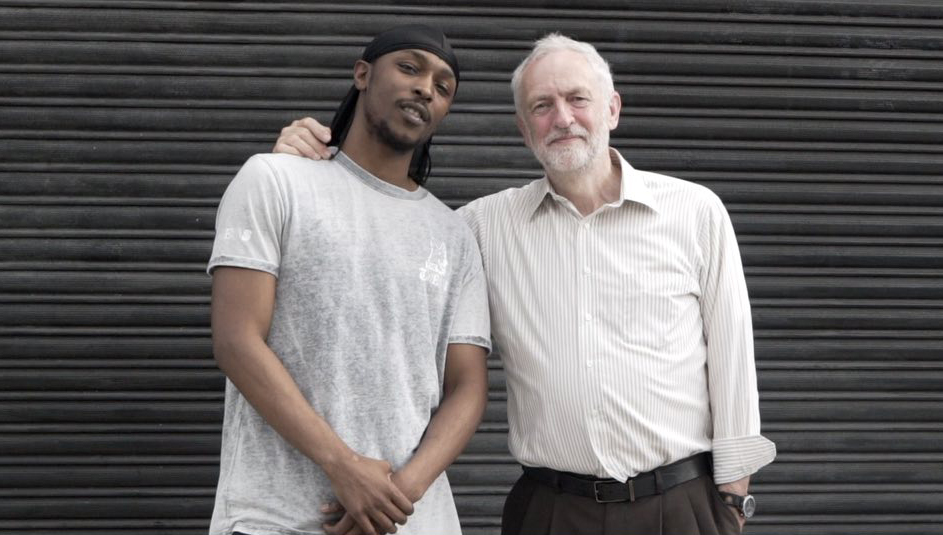UK music industry responds to shock election result

Photo: Jeremy Corbyn with rapper JME
The UK music industry concedes that things have become more “complicated” as a result of the country’s election’s shock election result late last week.
The prospect of a hung Parliament – and speculation that another general election may even be held this year – makes things harder for the UK music industry to achieve what it says are its priorities.
It needs the UK Government to:
- Support the European Commission’s proposals to force user-generated platforms like YouTube to “pay fairly for the music they use to build their businesses.”
- Introduce a series of tax credits to expand the music biz.
- Make the UK the place for artists from around the world to come and make music.
Geoff Taylor, CEO of labels trade body BPI, says it will be lobbying to ensure that the three priorities outlined above remain in the forefront.
“However, greater uncertainty over an extended period, with the possibility of a further election before the full Parliamentary term, is unlikely to be helpful,” he said.
“The Government must make creative businesses a priority and ensure a Brexit deal that benefits creative businesses like music — making sure that UK artists can tour freely in EU markets and that UK businesses can access the best talent.”
UK Music’s Chief Executive Michael Dugher is emphatic. “Over the coming weeks there will be many discussions about the future direction the country will take” and “it is paramount that the interests of the music industry are fully considered in those conversations.”
He added, “Brexit is clearly the biggest issue facing the country –and our industry –and we will ensure that the interests of our members across the Music industry are protected.”
Dugher reiterates that all the main political parties promised before the election to help the creative industries grow.
“We will be holding their feet to the fire to ensure that they deliver on those pledges.”
The Music Managers Forum also wants the major parties to stay true to their promises “that content creators are appropriately rewarded for the content they make available online,” said CEO Annabella Coldrick.
The MMF also stresses that the previously expressed support for anti-scalping concert ticket measures and bolstering up the nation’s live music venues continue.
Deborah Annetts, CEO of the Incorporated Society of Musicians, said that 2016 had been a record year for UK music with the creative industries contributing £87.4 billion (A$187.4 million) to the economy.
“But the only way we are to continue this success when other parts of the economy are beginning to struggle, is to ensure freedom of movement for the music community and an education policy which guarantees the creation of the talent for the future,” she said.
“The incoming Government must listen to the music industry and the creative industries. We are the future in this uncertain world.”
The Conservatives, Labour and Liberal Democrats have all pledged support to ensure that UK talent is financially rewarded for their digital work.
They also agreed that immigration laws allow that recording artists and music tourists be allowed to enter the UK.
The issue for the creative industries is just how dedicated they will be to ensure that such pledges are maintained.
Culture Secretary Karen Bradley and Culture Minister Matt Hancock kept their seats, which suggests stability for the music industry.
But speculation is that they might be moved to new portfolios which means that the industry will have to continue negotiations with new faces.
The music industry is also optimistic that a hung parliament could make it easier for Labour, which gained 29 seats, to keep its promises to the creative sectors.
Labour leader Jeremy Corbyn, who has called on the PM to “go and make way for a government that is truly representative of this country,” has pledged to help the music industry after the election.
Earlier in the year he launched the party’s cultural strategy called Creative Future For All. He pledged £1 billion over five years for the new Cultural Capital Fund to preserve all the arts to be preserved in the digital age.
The £160 million ($270.4 million) per year Arts Pupil Premium would bring the arts and music to primary school students.
He also reiterated he would help smaller music venues to survive rental and council rates upswings, repeating his earlier observation, “Every Adele or Stormzy has to start somewhere.”
Corbyn, who enjoyed the support of many entertainers including huge names in the grime scene, has been credited with inspiring a massive youth voter turnout.

































